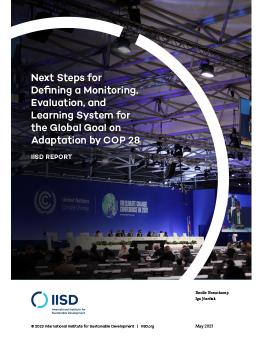
Next Steps for Defining a Monitoring, Evaluation, and Learning System for the Global Goal on Adaptation by COP 28
In 2015, the Paris Agreement marked a global change in the commitment of countries to address adaptation, capturing the need to increase its visibility and support for it. As part of the efforts to bring adaptation "on parity" with mitigation, parties established the global goal on adaptation (GGA) to serve as an overarching aspiration to raise ambitions and accelerate collective actions on adaptations. In other words, the GGA implicitly involves the conceptual and methodological framework through which countries and the United Nations Framework Convention on Climate Change (UNFCCC) will conduct the monitoring, evaluation and learning (MEL) of adaptation under the Paris Agreement.
-
The GGA presents an opportunity to incentivize and strengthen MEL systems in countries and globally while shifting power to national and local #adaptation strategies, needs, and priorities.
-
Ahead of #COP28, defining the modalities, timelines and roles for implementing a global MEL system on #adaptation under the GGA framework is crucial.
-
The GGA must focus on its overarching goal of enhancing #adaptation action and meeting developing-country needs from its first adoption onwards rather than becoming a long-lasting methodological exercise.
In 2022, countries created at COP 26 the Glasgow-Sharm-el Sheikh (GlaSS) work program on the GGA, a 2-year program aimed at exploring how the GGA can be operationalised. Additionally, countries agreed at COP 27 to use the last year of the GlaSS to finalize a GGA framework with a view to adopting it at COP 28. The forthcoming GGA framework provides an opportunity to define a global MEL system for assessing collective progress on adaptation. This is important to increase visibility of adaptation globally, inform directions for finance and improve adaptation action worldwide. This report first provides an overview of key concepts and elements needed under MEL systems, along with examples and relevant conceptualizations for the GGA for actors to advance their understanding and views of a prospective GGA framework by COP 28.
You might also be interested in
What Will Happen at COP 29?
Talks at the 2024 UN Climate Change Conference (COP 29) will range from defining a way forward on finance through a new collective quantified goal (NCQG) to mitigation, and loss and damage. Ahead of negotiations in Baku, IISD’s Earth Negotiations Bulletin Team Lead Jennifer Bansard examines the agenda and breaks down what to watch as eyes turn to Azerbaijan.
What Is the NAP Assessment at COP 29, and Why Does It Matter?
At the 29th UN Climate Change Conference (COP 29) in Baku, countries will assess their progress in formulating and implementing their National Adaptation Plans. IISD’s adaptation experts Orville Grey and Jeffrey Qi explain what that means, and what’s at stake.
IISD Annual Report 2023–2024
While IISD's reputation as a convenor, a trusted thought leader, and a go-to source on key issues within the sustainable development field is stronger than ever, the work happening outside the spotlight is just as valuable.
Budgeting for Net Zero
This study estimates the cost gap for battery energy storage systems (BESSs), offshore wind, solar photovoltaic (PV), electric vehicles (EVs), and green hydrogen (GH2) to inform government support.